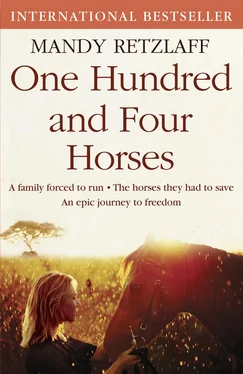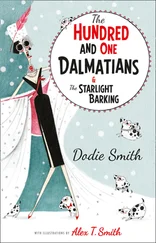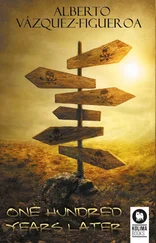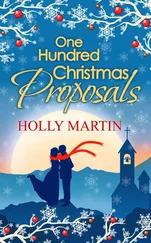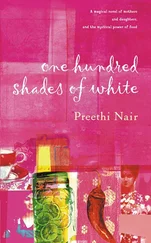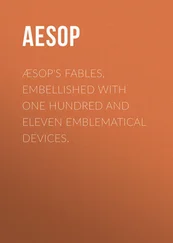“Be careful with her,” Pat’s mother began. She had a tone that verged on the ominous, and Pat wondered if there was a story hidden here, something buried in Frisky’s past of which he was not aware. He looked down at her, judged her to be ten or twelve years old. Hardly a foal, she must have had owners before, people who loved her like he knew he would.
“Well,” his father said, “what are you waiting for?”
Pat brought her around. Across the farm, there were antelopes such as the tiny duiker or huge kudu to chase. He ran a hand through Frisky’s mane. She was, he knew, going to love this.
Duiker on the left, kudu on the right. Frisky would rather chase the tiny duiker, but today she was happy to indulge Pat and they set off toward the kudu. Soon, the small herd scattered, and Pat and Frisky were through them, following a dirt track into the bush. The msasa trees were low here, and Frisky banked, first one way and then another. They were on the tail of some bushbuck when Pat ducked to avoid a low-hanging branch. He timed it badly, smashed into the bough. Beneath him, Frisky cantered on. Momentarily Pat grappled with the branch. Then, he fell. When he hit the ground, all the wind was expelled from his lungs. He lay there and heaved. Blackness came over him.
When Pat looked up, Frisky’s face was all that he could see. She was standing over him, nosing forward, as if to make sure he was all right. When he began to stir, she walked away and turned slightly, presenting her saddle.
Get up, Pat , she seemed to be saying. We haven’t got time for lounging around. That bushbuck’s already got away …
When they reached home, Pat tried to hide the fact that he had fallen off—but his mother had already raised two other sons, and somehow she just knew. It was time, she told him as she dusted him down, for a story.
Frisky had once belonged to the relation of a local farmer, a gift for their young daughter. She had been the daughter’s pride and joy, and she had spent long hours being ridden and groomed, doted on by all members of the family.
It was on a ride through the bush that tragedy had found Frisky. Startled by some smaller creature shooting out of the bush, she had shied away and the girl in her saddle had been thrown. Like Pat had done, the girl lay in the dust; but unlike Pat, she would never get back up. Stricken with grief, the girl’s parents could no longer look at Frisky. Their daughter’s death hung heavy about them, and Frisky was a symbol of it. She would have to be sent away, or else destroyed.
Two weeks later, she arrived at Pat’s father’s farm.
“So you must be careful,” Pat’s mother concluded.
After the story, Pat did not stop to get changed. Instead, he went back to the paddock, where Frisky was waiting. He spent the night checking over her hooves and grooming her. Whatever happened in Frisky’s old life, it was not her fault. In the years to come Pat would come off Frisky many times—a hole in the ground that she did not see, the assault of a low-hanging branch—but not once would he be thrown. All he ever had to do was remember the way she waited for him as he lay, winded, in the dust, and he knew: Frisky would look out for him just as much as he would look out for her.
That night in 1976, talking to this strange man in his ill-fitting and bloodstained suit, I was suddenly transported back to memories of my own childhood horse. I had longed for a horse like Frisky, one who would be my best friend and protector and in whose saddle I could lose myself for days at a time, but I was not as blessed as Pat. The horse I remembered was named Ticky. He was a fiery little piebald pony and threw me from the saddle more times than I can remember—but I loved him more than anything else.
I was eleven years old when Ticky entered my life. I was attending school in Johannesburg, and a new girl was enrolled in my class. Her name was Erica, and she lived on a small farm just outside the city, where her parents kept a whole herd of horses. When I was finally invited to stay with Erica for the weekend, it was a dream come true. We spent long hours brushing her horses’ manes and combing their tails. We would both jump onto her horse and canter bareback for hours around the farm. Every time I returned home from Erica’s, the only words that came out of my mouth had to do with horses.
On one of my weekends with Erica, we stopped fussing over her mare and watched as her father drove into the farmyard, pulling a horse box behind his truck. With a silent nod, he unloaded a small piebald gelding, perhaps only twelve hands high and with a very slight stature.
“His name,” Erica’s father told us, “is Ticky.”
Ticky looked at us balefully, but Erica and I were not deterred. We circled him, trying to get close enough to brush his hair and comb his tail as we had the rest of Erica’s horses, but he just stared at us with a malevolent twinkle in his eyes. Every time we came close, he swished his tail dismissively, shuffled away, and went back to grazing.
Nevertheless, I was obsessed.
When my father came to collect me, I squeezed his hand and begged him to ask Erica’s father if Ticky was for sale. Unconvinced, my father suggested I should try and ride Ticky first, before we made any rash decisions. At last, a date was made, and I returned to Erica’s farm, determined that Ticky should fall in love with me the same as I had fallen for him. Beautifully tacked up, Ticky awaited my arrival with that same baleful stare. All the same, I stroked his tangled mane and whispered sweet words to him. In reply, he bared his big yellow teeth, rolling his eyes.
Confident that as soon as we were riding we would form an unbreakable bond, I hoisted myself into the saddle, grinning at my father as I did so. Yet, before I could even grab the reins, Ticky took off, tearing down the driveway and out onto the open veld. In seconds, I had lost my balance, tumbled from the saddle, and landed flat on my back, all the wind knocked out of me.
By the time I looked up, Ticky was already headed for home. I trudged back alone. Once again, I hoisted myself into the saddle and, this time, was swift enough to snatch up the reins. I gave Ticky a gentle kick, and off we went.
Suddenly, Ticky put his head down and executed a buck. Unable to stop him, I soared through the air and landed headfirst on the road.
By the time the blurriness was fading, my father was standing over me. He looked down, his face swimming in and out of focus, and reached out to help me to my feet.
“Are you sure you want this horse?” he demanded, face creasing with anxiety. “It looks uncontrollable to me.”
Dazedly, I nodded. There was no going back, no matter how wicked this little pony really was.
All these years later, listening to Pat talk about his own childhood horses, I wondered if Ticky might have been the sort of horse he would have liked: strong, willful, but intelligent beyond measure. My parents quickly learned to detest Ticky. I spent my nights protesting, declaring my unwavering love for the nasty little horse who would pin me against his stable wall, lunging for his bucket, but somehow I knew they could not be convinced. No matter how many times he bit, no matter how many times he kicked out, my resolve only hardened: Ticky was the horse for me. He was going to love me like I loved him, or the world would surely end.
One day, some months into my struggle with Ticky, we entered ourselves into the bending race at a local gymkhana (an equestrian meet). At Erica’s farm, we cornered Ticky, fitted him with his bridle and saddle, and walked—or perhaps dragged—him to the club where the competition was to be held. As we approached, I could hear the cries of a huge crowd of excited children and eager parents and the neighing of all their horses.
Читать дальше
